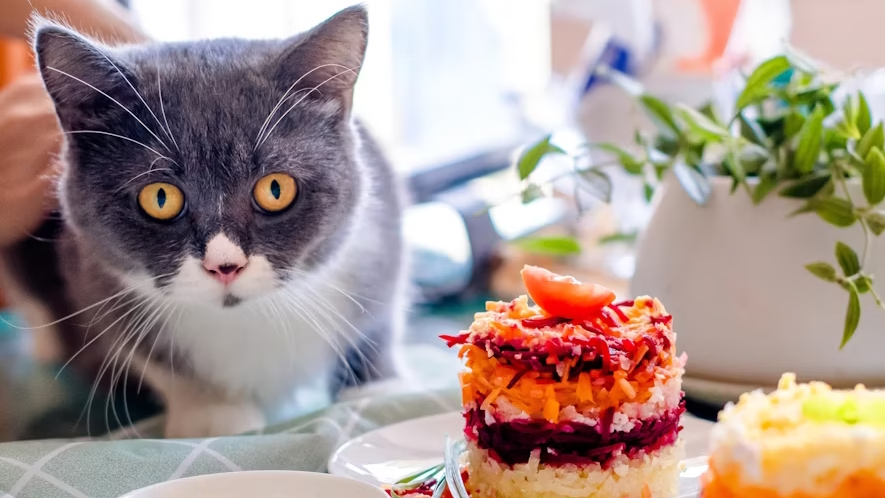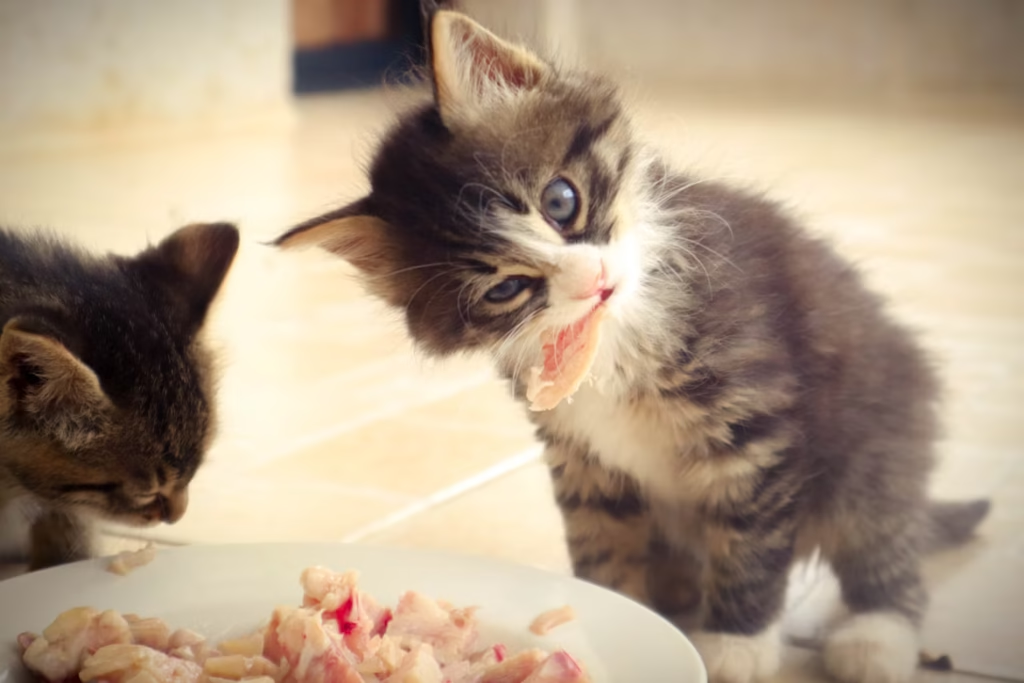What Human Food Can Cats Eat? A Vet’s Complete Guide to Safe and Unsafe Options

As cat parents, many of us know the familiar scene: you’re sitting down with dinner, and suddenly, there it is—that piercing feline gaze. Your cat’s eyes lock onto your plate, full of curiosity (and maybe a little hope). You may even hear a soft meow or feel a paw gently tap your arm, as if to ask, “Can I have some?”
This innocent moment sparks a big question that comes up often in vet clinics, pet forums, and even in everyday conversations: what human food can cats eat?
On the surface, sharing a bite of your meal with your cat may feel like an act of love, but it’s not always safe. Some foods can give your cat a nutritional boost, while others can land them in the emergency clinic. Knowing the difference can mean the world to your cat’s health and happiness.
I’m Dr. Elena Vargas, a veterinarian specializing in feline nutrition for over 15 years. I’ve guided countless cat owners on what foods are safe, what to avoid, and how to make smart choices when it comes to those pleading eyes at the dinner table. In this article, I’ll walk you through:
- The nutritional basics of cats and why they’re different from us.
- 11 safe human foods that cats can enjoy in moderation (with vet-approved tips on serving them).
- 5 foods to absolutely avoid because they can harm your cat.
- How to approach the question of what human food can cats eat everyday without compromising health.
Let’s dive into the essentials of feline nutrition before exploring the safe and unsafe food lists.
Table of Contents
Why Human Food for Cats Requires Extra Caution
Cats are obligate carnivores. Unlike dogs, who can thrive on a more flexible diet, cats are designed by nature to eat primarily animal protein. Their bodies depend on nutrients like taurine, arachidonic acid, and certain vitamins that are found naturally in meat. This means plant-based foods can only play a very limited role in their diet.
Still, this doesn’t mean cats can never taste human food. The key is balance. Occasional safe snacks from your plate can add variety and even provide certain health benefits. But these extras should make up no more than 10% of your cat’s daily calories. Too much “people food” can lead to obesity, diabetes, or nutritional deficiencies.
From my own experience in veterinary practice, I’ve seen well-meaning owners accidentally put their cats at risk by offering the wrong treats. I’ve also seen cats benefit when owners introduced certain safe foods thoughtfully.
So, when wondering “what foods can cats eat” or “what can cats eat from human food,” remember: the goal is to enhance their diet, not replace it.
11 Human Foods Cats Can Eat Safely

Here are the top vet-approved answers to what human food can cats eat—foods that are not only safe but can actually be beneficial when offered properly.
1. Cooked Chicken
If there’s one food cats universally adore, it’s chicken. Plain, cooked chicken is high in lean protein and an excellent source of taurine.
Vet tip: Avoid giving skin, bones, or seasoning. Garlic, onion, and too much fat are dangerous for cats. Shredded boiled or baked chicken is best.
Serving idea: Mix a teaspoon into your cat’s kibble. If you poach it, the broth can encourage hydration.
2. Cooked Turkey
Turkey is another lean protein that supports muscle maintenance and healthy skin. Many cats enjoy it as much as chicken.
Vet tip: Skip the fatty skin or gravy. Plain roasted turkey breast works best.
Serving idea: Cut into pea-sized bites for occasional treats or sprinkle tiny amounts daily on dry food.
3. Cooked Fish (Salmon or Tuna)
Fish often raises the question of what human food can cats eat everyday. While not suitable as a daily staple, cooked salmon or tuna can be wonderful in small amounts. Rich in omega-3 fatty acids, fish supports joint health and gives cats a shiny coat.
Vet tip: Wild-caught salmon is safer to avoid mercury buildup. Always cook the fish and serve without oils or spices.
Serving idea: Offer once a week by flaking over wet food.
4. Eggs
Scrambled or boiled eggs provide complete protein and biotin, supporting claw strength and overall energy.
Vet tip: Always cook eggs fully—raw eggs carry risks of salmonella and enzyme imbalances.
Serving idea: A teaspoon of scrambled egg once or twice weekly.
5. Plain Yogurt
Most adult cats are lactose intolerant, but plain unsweetened yogurt (especially Greek yogurt) is usually gentle enough. It also provides probiotics for gut health.
Vet tip: Stick to small portions and avoid anything with artificial sweeteners.
Serving idea: A teaspoon served plain or frozen into small cubes as a summer snack.
6. Cooked Carrots
Carrots, when softened, offer beta-carotene for eye health. Cats can’t thrive on vegetables alone, but carrots can add useful fiber and vitamins.
Vet tip: Cook until soft; raw carrots are tough for cats to digest.
Serving idea: Mash or puree and mix with chicken or turkey.
7. Blueberries
These tiny fruits pack antioxidants that support urinary and immune health. They’re safe for cats and fun to play with, too.
Serving idea: Offer 2–3 blueberries weekly, either mashed or whole.
8. Oatmeal
Plain oatmeal (no sugar or flavoring) can add fiber that helps with digestion and hairball control.
Serving idea: Mix a tablespoon with wet food once or twice a week.
9. Pumpkin
Pumpkin is a vet’s go-to remedy for mild digestive issues. It helps regulate both constipation and diarrhea thanks to its high fiber content.
Serving idea: A teaspoon of canned plain pumpkin (not pie filling) added to meals daily.
10. Apples (No Seeds)
Seed-free apple slices are safe and provide fiber and hydration. The crunch may also help with dental hygiene.
Vet tip: Apple seeds contain cyanide compounds, so always core the apple first.
Serving idea: Offer thin slices 2–3 times weekly.
11. Cheese (Small Amounts)
Though many cats don’t tolerate milk, small amounts of low-lactose cheese like cheddar or Swiss can be enjoyed.
Serving idea: A pea-sized cube as an occasional training treat.
5 Human Foods Cats Should Avoid

Now let’s turn to the danger list. When people ask “what foods are bad for cats?” these are the top culprits I emphasize as a veterinarian.
1. Chocolate
Contains theobromine and caffeine, both toxic to cats. Even small amounts can cause seizures or heart issues.
2. Onions and Garlic
Both destroy red blood cells, leading to anemia. Even powdered forms in soups or sauces are dangerous.
3. Grapes and Raisins
Linked to sudden kidney failure in cats. No safe dose exists.
4. Dairy Milk
Most adult cats can’t digest lactose, leading to diarrhea and bloating.
5. Raw Meat and Eggs
Risk of bacterial infection (salmonella, E. coli) and parasites. Cooked options are always safer.
Can Cats Eat Human Food Every Day?
This brings us to one of the most common questions: what human food can cats eat everyday?
The answer is: small amounts of lean, cooked proteins (like chicken or turkey) and safe vegetables (like pumpkin or carrots) can be offered daily in moderation. The key is keeping portions small and treating them as supplements—not replacements—for a balanced cat food diet.
Cats thrive on consistency. A commercial cat food formulated to meet all nutritional needs should remain the foundation of their diet. Human food should be a bonus, not the main course.
Final Thoughts: Safe Snacking with Your Cat
So, what can cats eat from human food? Quite a few things, as it turns out—but always in moderation, and always prepared safely. By focusing on the 11 safe foods and steering clear of the 5 harmful ones, you can make snack time with your cat both joyful and healthy.
Remember, every cat is unique. Some may tolerate certain foods better than others, and cats with medical conditions (such as kidney disease or allergies) may need stricter rules.
When in doubt, consult your veterinarian. A quick call is worth preventing an emergency visit later.
Sharing safe human food with your cat can strengthen your bond and enrich their life. Just keep in mind that the best treat you can give is one that keeps them happy, healthy, and by your side for years to come.
